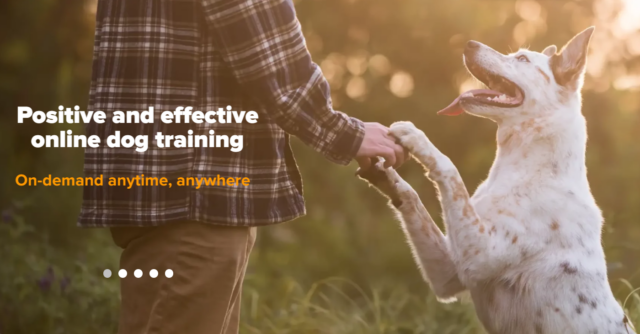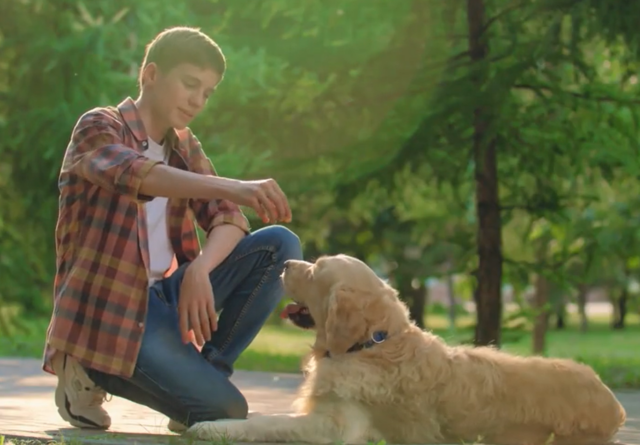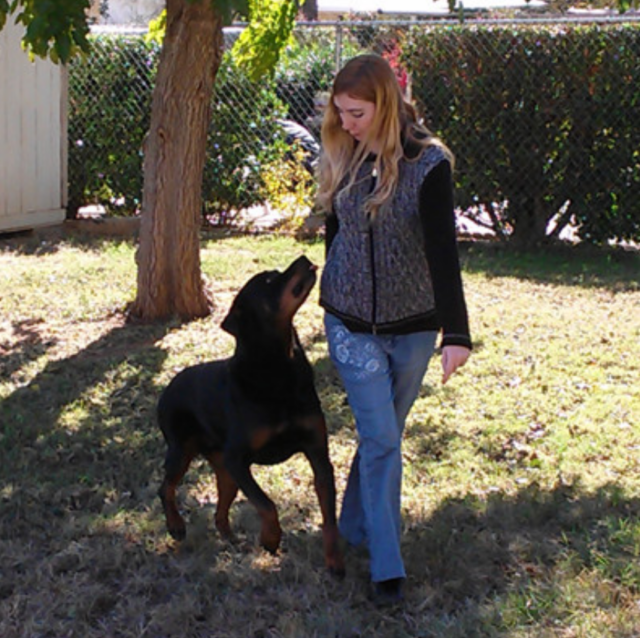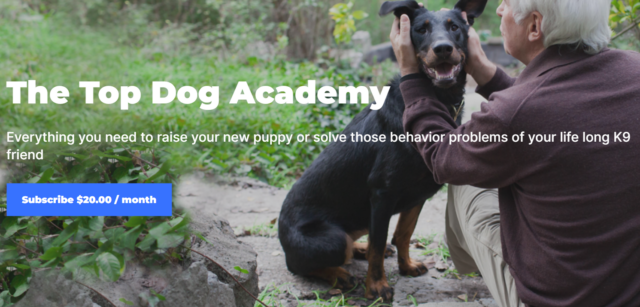
It’s no secret that taking your dog out for a walk can quickly turn into a battle of wills if they haven’t mastered proper leash manners. Having your arm yanked out of its socket by an over-excited canine can be more than just frustrating—it’s also potentially dangerous for both you and your pet. Therefore, loose-leash training your dog can save a life!
Fortunately, the internet is awash with solutions for this common problem. In an era where digital learning is as commonplace as a wagging tail, the opportunity to curb these errant behaviors is just a few clicks away. This article will guide you through six of the best online courses that can help you teach your dog to stop pulling on the leash and transform your tug-of-war encounters into peaceful strolls.
Our Picks for the Best Online Dog Training Classes for Teaching Your Dog Not to Pull on The Leash
The iHeartDogs team reviewed all the popular online dog training courses that include a class on loose leash walking. Here’s our top recommendations:
1. K9 Training Institute (Best Overall)
K9 Training Institute vows to train your dog to behave by using the same techniques used to keep service dogs so calm and well-behaved. Most of this company’s training focuses on body language instead of verbal commands. These methods can work for all dogs regardless of their age or breed.
This company’s online training starts with a free workshop that covers topics like barking, chewing, potty training, nipping, stop leash pulling, (loose-leash walking) house-breaking and ignoring commands. Once you complete the free training workshop, you can choose to purchase more online classes to further your furry friend’s learning. After all, training is something that should continue throughout your dog’s life, not just for one class.
The trainers at this company are especially passionate about helping train rescue dogs to give them better chances at success in their new homes.
2. SpiritDog Training (Best on a Budget)
SpiritDog Training offers online dog training courses for canines of all ages, breeds, behaviors, and training levels. The dog trainers at this company have created videos to walk dog parents through each course, and you can rewatch videos as many times as needed. Every person who signs up for SpiritDog gets unlimited feedback from professional trainers for life. So, if you get stuck while watching a video, you can ask a trainer as many questions as you’d like.
You can choose from individual courses, or you can purchase bundles to save money. Here are some of SpiritDog’s most popular classes & bundles:
- Stop Resource Guarding
- Tackling Reactivity Bundle
- Ultimate Puppy Program
- Ultimate Masterclass Bundle
SpiritDog courses always focus on loose-leash walking, housebreaking your dog, positive reinforcement training to make training an uplifting, productive experience for dogs and set them up for success. These classes differ from in-person training because they allow you to train your dog at your own pace in an environment that’s comfortable for them.
3. Kingdom of Pets
Kingdom of Pets offers several books dedicated to dog training. Yet, many pet parents benefit more from seeing dog training in action rather than just reading about it. Thus, the company also has many online training videos for purchase, covering areas like leash walking, barking, chewing, and aggression.
Once you purchase a training package, you get lifetime access to that content. All courses from Kingdom of Pets aim to create positive experiences for dogs, and they teach customers how to effectively use reward-based training in a way that’s beneficial for both you and your canine companion. The trainers at Kingdom of Pets want to ensure that their training resources are effective for pet parents, so if you don’t find success within the first 60 days of training, you can get a refund with no questions asked.
However, this company allows you to try a free 6-day course before paying anything to ensure that this is the right training company for you. The free course offers information about dog and cat training, pet health needs, and animal behaviors.
4. Brain Training for Dogs
The professional trainer who runs Brain Training for Dogs spent ten years perfecting her training methods. Thus, her online training classes are in-depth and designed to tackle any behavioral issue in dogs, no matter how complicated the issues may seem. The training focuses on a dog’s mental stimulation to enhance their intelligence and learning capabilities. The courses will also help dog parents get to the root of the problem instead of only fixing it on a surface level.
Some of the many issues these training courses focus on include potty training, jumping, digging, excessive barking, and ignoring commands. The course videos get right to the point so you don’t have to waste any time. The trainer approaches each problem behavior by finding a way for the dog to understand what they’re supposed to be doing.
Once you order the bundle of all these classes, the trainer will offer you support along the way whenever you need it. The first 60 days of the program is a trial period, so if you don’t find success with the training practices, you can get your money back. That’s how important your dog’s success is to this company.
5. Dunbar Academy
Like K9 Training Institute, Dunbar Academy offers a Free Course Collection for dog parents that aren’t sure if online training is right for them. They offer several free courses, such as “Guide to Getting a Puppy or Dog,” “Six Simple Steps to Solve Your Dog’s Behavior Problems,” and “Dog Shelter Behavior & Training Program.”
If you like the way the free courses work, you can get more in-depth courses through a monthly or yearly fee. With the subscription, you can access hundreds of hours of content to help your dog succeed. That content includes videos, ebooks, podcasts, worksheets, and webinars, so there are methods that appeal to every person. You’ll also get access to a Facebook group where you can get training advice from dog trainers and other members.
You can also purchase individual bundles instead of a subscription if you only want to focus on certain training areas. Some popular bundles include Puppy Training, Behavior Problems, and a Games Workshop. The trainers at this company focus on games and reward-based training to get positive results.
6. Holly and Hugo
Holly and Hugo not only offers a variety of training courses, but they also have videos about animal behavior and care. With the help of pet experts and experienced teachers, you can access a variety of videos and content to improve your pet’s life. The courses cover topics like training, animal psychology, pet sitting, and grooming.
Customers can purchase courses individually or pay a discounted price to get access to all the courses. At the end, you get a certificate of completion. Some of the courses even qualify for CE and CPD points for dog lovers looking to pursue a career in the animal industry.
This training option is great for dog parents who like to work on a schedule because once you activate a course, you have 60 days to complete it (unless you choose to extend it). With a time limit in place, it can help keep you motivated to train regularly so your dog can succeed. The trainers at Holly and Hugo love dogs as much as you, so they set up these courses to provide the best support for your furry friend.
Frequently Asked Questions About Teaching Your Dog Not to Pull on a Leash
1. What are the signs that my dog has a leash-pulling problem?
It’s usually quite clear when a dog has a leash-pulling problem. If your dog is constantly tugging, ignoring your attempts to slow or stop, or causing discomfort or even pain in your arm, it’s likely they need training to improve their leash manners.
2. Why does my dog keep pulling on the leash?
Dogs pull on the leash for a variety of reasons, primarily due to excitement and their instinctive exploration behaviors. Your dog may be eager to reach a particular destination, or they might be distracted by smells, other animals, or simply the joy of movement.
3. How long does it take to train a dog not to pull on the leash?
The duration of the training can vary depending on the dog’s age, breed, temperament, and past leash experiences. On average, it can take several weeks to a few months of consistent and patient training for a dog to stop pulling on the leash.
4. Are certain breeds more prone to pulling?
While all dogs can develop a habit of pulling on the leash, some breeds known for their energy and strength, like huskies and labradors, may be more prone to this behavior. Remember, though, that each dog is an individual, and training is often more about their personal temperament and behavior than their breed.
5. Should I use a specific type of collar or harness for loose leash training?
Certain types of collars and harnesses can help discourage pulling, such as front-clip harnesses or head collars. However, it’s essential to ensure any equipment you use is comfortable for your dog and doesn’t cause any pain or distress.
6. Can old dogs be trained not to pull on the leash?
Yes, old dogs can indeed learn new tricks! While it might take a little more time and patience, adult and senior dogs can learn to walk without pulling on the leash. The key is consistency and positive reinforcement.
7. Is it necessary to use treats for leash training?
Treats are a great tool for positive reinforcement training, and they can be particularly useful for leash training. When your dog walks nicely without pulling, giving a treat rewards and reinforces this good behavior. However, treats aren’t the only form of reward; praise and petting can also be effective.
8. How long should each loose leash training session be?
Each training session should ideally last around 5 to 15 minutes, but this can vary depending on your dog’s attention span. It’s more effective to have short, frequent training sessions than infrequent, longer ones.
9. What should I do if my dog starts pulling during a walk?
When your dog starts pulling, it’s recommended to stop walking or change direction. This teaches your dog that pulling won’t allow them to go where they want. After they’ve calmed down and the leash is loose again, you can continue walking.
10. How often should I train my dog not to pull on the leash?
You should take every opportunity to train your dog not to pull on the leash. Every walk is a potential training session. Over time, your dog should start to understand what is expected of them when they’re on the leash.
11. Can I train multiple dogs not to pull at the same time?
Training multiple dogs at the same time can be challenging, as they may distract each other. It’s usually more effective to train each dog individually until they’ve learned to walk without pulling, and then you can begin walking them together.
12. Can I still let my dog explore while on walks?
Yes, exploring is a crucial part of a walk for a dog. However, it’s important to balance this exploration with controlled walking. You might allow your dog to explore when the leash is loose, but when you need them to walk nicely, they should be able to do so.
13. Should I punish my dog for pulling on the leash?
Punishment is generally not recommended in dog training. Instead, use positive reinforcement to reward your dog for good behavior. If they pull on the leash, stop moving until they stop pulling, rather than punishing them for it.
14. Are online courses effective for teaching dogs not to pull on a leash?
Yes, online courses can be very effective for teaching dogs not to pull on a leash. They provide detailed instructions and demonstrations that you can follow at your own pace, often coming with support from professional dog trainers.
15. What if I’m struggling to train my dog myself?
If you’re having difficulty training your dog not to pull on the leash, don’t hesitate to seek professional help. Dog trainers and behaviorists have the experience and knowledge to handle these issues effectively and can provide personalized advice and strategies.
16. What is Loose Leash Training?
Loose leash training is a type of dog training technique that aims to teach dogs to walk nicely on a leash without pulling or straining against it. The goal of loose leash training is to make walking a more pleasant experience for both the dog and the handler. It’s about establishing a cooperative and respectful relationship between dog and handler where the dog understands to stay near the handler without tension on the leash.
Conclusion: Best Online Training Classes for Teaching a Dog Not to Pull on Leash
In a world where you can virtually learn anything online, it’s refreshing to know that even age-old issues like your dog pulling on its leash can be resolved from the comfort of your home. These six online courses underscore the fusion of modern technology with effective canine training methods. Whether you have a stubborn old-timer or an energetic puppy, there’s a solution for every dog and owner. Remember, consistent and patient training is key, and with these courses, you can turn each walk into an enjoyable bonding experience rather than a test of strength. So why wait? Start a course today and take the first step towards more relaxed, enjoyable, and safe walks with your furry friend.
- 7 Best Online Dog Training Courses 2023
- SpiritDog Training Review - Is It Worth The Price?
- Brain Training for Dogs Review 2023
- K9 Training Institute Review 2023
- 6 Best Online Training Courses to Teach Your Dog Not to Pull on Leash
- 6 Best Online Training Courses to Teach Your Dog to Stop Resource Guarding
- 6 Best Online Dog Training Course for Potty Training
- 6 Best Online Dog Training Courses to Teach a Dog Not to Jump On People





 Toledo, United States.
Toledo, United States.